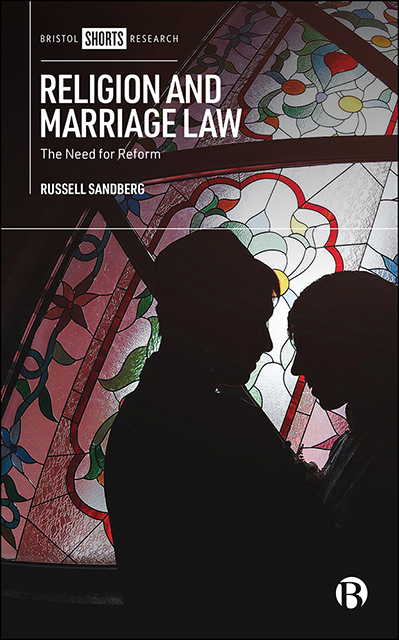Two - Religion and Opposite-Sex Marriage
Published online by Cambridge University Press: 18 April 2023
Summary
Introduction
This chapter begins our discussion of the current position on how adult intimate relationships are governed by the law of England and Wales, with particular reference to how it affects religion. It examines the legal regulation of opposite-sex marriage, placing the current law as found in the Marriage Act 1949 within its historical context to explore why the Church of England has been placed in a special legal position and why the current position of other religious weddings is often misunderstood. Given these misunderstandings, this chapter will begin with a discussion of the current law before placing this within its historical context.
The current law
Religious groups may conduct marriage ceremonies, but for a marriage conducted in England and Wales to be legally binding it needs to comply with the requirements laid out in marriage law. The Marriage Act 1949 differentiates between marriages solemnised according to the rites of the Church of England/Church in Wales and marriages otherwise solemnised. This second category of marriages otherwise solemnised includes: (1) civil marriages in a register office or in approved premises; (2) marriages ‘according to the usages of the Society of Friends’; (3) marriages ‘between a man and a woman professing the Jewish religion according to the usages of the Jews’; and (4) marriages in any place of worship registered under the Places of Worship Registration Act 1855 and section 41 of the Marriage Act 1949.
All religions (other than the three specifically named in the Act: the Church of England/Church in Wales, Society of Friends and Jews) fall under this last category. They can therefore conduct lawful marriages provided that their buildings are registered and there is a registrar or authorised person present. Under section 43 of the Marriage Act 1949, an authorised person (such as the minister) can be appointed by the governing body or trustees of the building provided that their details are then authorised to the Registrar General and to the Superintendent Registrar of the registration district in which the building is situated.
The fact that three religious groups are specifically named in the legislation has led to some confusion. A Council of Europe resolution and some commentators have asserted that only the named faiths have to register their marriages. This is not true. There is no gap in the Marriage Act 1949 for religious groups other than the three mentioned.
- Type
- Chapter
- Information
- Religion and Marriage LawThe Need for Reform, pp. 9 - 18Publisher: Bristol University PressPrint publication year: 2021



